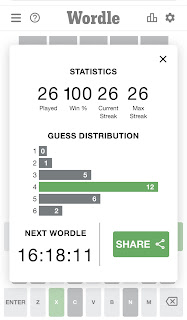I'm learning Welsh on Duolingo. Most people in our department are doing a language on it, in some cases for practical purposes but for many of us, for family reasons. In my case, my grandmother was Welsh and spoke it as a first language, so I feel a connection to it for that reason even though I'm not Welsh myself. My other grandparents also lived in Pembrokeshire for a long time, though they weren't Welsh, and so when we visited we'd hear it spoken, especially if we went along the coast a bit to Carmarthenshire.
I knew a fair amount about Welsh grammar before I began, because I'm a linguist so I happen to know quite a few things about quite a few languages that I don't speak, and Welsh is a language that has been studied and written about reasonably often. It's frequently studied alongside others as well as in its own right because you can compare it to other Celtic languages for within-family comparative work, or with languages from other families where it's useful as an example of a language that has VSO word order.
Backtrack! VSO? V stands for Verb, S for Subject and O for object, and these three letters are how we talk about the basic or default order of the elements of sentences in a language. English is SVO: [S The British public] [V despise] [O the current government]. This is one of the two most common orders globally, the other being SOV (e.g. Korean). VSO is less common and it can be useful, when examining linguistic theories, to illustrate how they work in languages with this order. The same VSO order is found in languages all over the world, including Berber, the Mayan languages, and Te Reo Māori.
There are lots of other interesting things about Welsh grammar, obviously, it's just that this is the one I happen to have read most about because word order is the area I've worked in most of all. And of course VSO is an abstraction and there is widespread use of auxiliary verbs (the English equivalent would be something like The British public is despising the government) which is still VSO but it's not quite so straightforward as just classifying languages and being done with it. Luckily, I suppose, or I'd be out of a job.
So all this is to say that as I begin to work out what the heck is going on with this language, I might write some posts about it. So far I'm floundering in the dark as many things are very different from English. The app starts you off with things where you can make comparisons, but I'm honestly finding some of it baffling. Of course you don't get explicit grammar instruction on Duolingo, so I've got myself a grammar book as well to help me work out the things that aren't easily deducible.
I assume they deliberately choose constructions to teach you that are similar to your language of instruction (English, in my case), to make things easier at the beginning. For me, a linguist, some of this was actually really surprising to me. For instance, all of the prepositions and articles that I've had to use so far have worked just like in English. Maybe this doesn't sound so strange but I know very well that prepositions and articles are infamously unpredictable and variable across languages. So when I'm getting sentences to translate that include a direct word-for-word equivalent of going to the office or whatever, I'm surprised. The main thing that has been different in this respect is the absence of an indefinite article (a/an in English), so here I felt back on more solid ground as I know this is a feature common to lots of languages and fully expected it.
Another, more specific, thing that seems weirdly the same is the verb(-type thing) mynd, which apparently means 'going'. English uses go for a travelling or motion event, like going to the office: I'm travelling from one place to another. Welsh also appears to do this: mynd i'r swyddfa is the direct equivalent, and both languages need to use it with a subject and an auxiliary verb: I'm going to the office or Dw i'n mynd i'r swyddfa. Here's the weird bit though: English also uses go for expressing the future, which is not totally bizarre but also not universal by any means, and Welsh seems to do the same. So just as in English you can say I'm going to wait here, you can say Dw i'n mynd i aros yma in Welsh, and they both express future with no motion involved. This use of go for expressing the future isn't unique to English and Welsh (French and Spanish have it, and Jamal Ouhalla describes it for Moroccan Arabic here) but it's also not that common. Perhaps someone can tell me whether this similarity is a result of the very close contact between the languages, a shared familial feature, or simply coincidence that both languages have travelled this grammaticalisation path, just like Moroccan Arabic.


